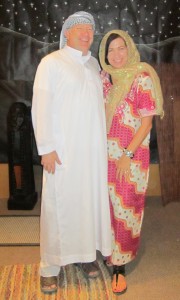Members of The Church of Jesus Christ of Latter-day Saints can be found across the world, with a surprising concentration of members in the Middle East.
Members of the Church in countries like the United Arab Emirates (UAE), Bahrain and Israel face the unique challenge of practicing their religion while still complying with and respecting the cultures and laws of these various countries.
Elder Jeffrey R. Holland of the Quorum of the Twelve visited Church members in the Middle East in 2011.
“I love the Middle East,” Elder Holland said in an article on lds.org. “We’re grateful to be there. In our meetings I encouraged the members to obey and sustain the laws of the countries they’re in. That’s been a blessing, as we’ve been allowed to meet together and grow as a Church.”

Jeffrey Herr moved to Dubai in the UAE in September 2011, and his wife joined him in March 2012. In Dubai, there are two wards; currently, Herr is serving as bishop in the Dubai First Ward.
Like other areas of the Church, ward and stake boundaries are divided geographically. However, because there are so few members in the Middle East, their stake boundaries can include several countries, which contribute to the wide diversity among members. For example, before the division of the Manama Bahrain Stake in 2011, the stake boundaries included seven countries. The division created the Abu Dhabi Stake, covering four countries, and the Manama Bahrain District, covering three countries.
“Over 60 percent of the members in the UAE are Filipino, and in our ward over 15 countries are represented, including Czechs, French, South African and Indian members,” Herr said. “There are five families in our ward from the U.S. but only one from Utah, so the ward has a very cosmopolitan and global feel to it.”
BYU freshman Cameron Price moved to Abu Dhabi with his family in 2007, when he was 13 years old. Overall, the cultural adjustment wasn’t as hard as he expected.
“The people are so generous and considerate over here,” Price said. “Many of their cultural and religious practices just became habit to me. For example, during Ramadan no one is allowed to eat in public, no matter your culture or religion. In Saudi Arabia, everything shuts down during prayer time. You don’t necessarily have to pray, but you just know that there will be nothing going on during that time. Also, since Fridays are considered to be the Muslim holy day, we hold our church services on Fridays and go to school on Sundays. I learned that it isn’t the actual day of the week that matters, but more that there is a day set aside for worship.”
Cameron Price’s father, Gary Price, served as stake president of the Manama Bahrain Stake and is currently serving as district president of the Manama Bahrain District. Through his years of church service in these callings he has recognized similarities between Mormons and Muslims.
“Many of the people here are familiar with Mormons, so there is a positive perception,” Gary Price said. “They are a kind people and religious people. They relate well to members of the Church because there is a lot of commonality between us. We both don’t drink alcohol, we both believe in strong family units and we both believe Abraham is our father.”
Still, being a member of the Church in those areas does have its challenges, especially as a Church leader. One challenge includes the family unit.
“Many people have moved here without their families,” Gary Price said. “They move here by themselves following job opportunities to provide for their families because they cannot find employment in their home country. Often times they are only able to see their families once a year. With the common separation of families, it is hard for these members to maintain a strong family unit.”
Leaders also advise members living in the area to be courteous to their neighbors.
“We are blessed to have the opportunity to meet as a congregation,” Gary Price said. “We are not recognized in all countries and therefore need to be careful to even practice. In some locations when we attend church, we do not go in full suit-and-tie attire. We dress nice then put our tie and jacket on once we get inside to not draw attention to ourselves out of respect for our neighbors.”
Members of the Church are used to being open to sharing religious beliefs or inviting others to church activities. However, these friendly gestures are against the law in the Middle East.
“There is absolutely no proselyting,” Gary Price said. “If a Christian expatriate inquires about the Church, we are allowed to invite them to a church meeting and with proper approval teach them about our religion. However, if they are Muslim, by law we are not allowed to share any information. Recently, a young man who is Muslim contacted me saying he had read the Book of Mormon and believed the Church to be true. He asked permission to attend a meeting and learn more. I had to tell him he could not meet with us and that if he wanted to learn more he would need to do it on his own through the internet or other publicly available resources.”
Despite drawbacks on proselyting and restrictions in spreading the gospel, the Church continues to progress in small ways.
“The Church is making progress over here. They just finished building the first LDS chapel in the Middle East in Abu Dhabi, which will be dedicated soon. It really is exciting and something positive for the area,” Gary Price said.




